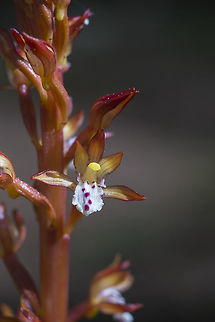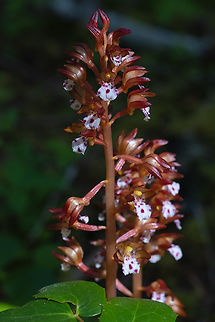
Appearance
''Corallorhiza maculata'' is a myco-heterotroph; it lacks chlorophyll and gets food by parasitizing the mycelium of fungi in the family Russulaceae. The rhizome and lower stem are often knotted into branched coral shapes. The stem is usually red or brown in color, but occasionally comes in a light yellow or cream color. There are no leaves and no photosynthetic green tissues. The stems bear dark red scales and intricate orchid flowers.''Corallorhiza maculata'' flowers are small and emerge regularly from all sides of the stem. The sepals are dark red or brown tinged with purple, long and pointed. The side petals are reddish, and the lip petal is bright clean white with deep red spots. It is usually lobed or toothed on the side and 7–10 mm. In some varieties, the lip is plain white without spots.

Uses
Several Native American groups historically used the orchid's stems dried and brewed as a tea for such maladies as colds, pneumonia, and skin irritation.''Corallorhiza macluata'' is also the topic of the poem ''On Going Unnoticed'' by Robert Frost.
References:
Some text fragments are auto parsed from Wikipedia.